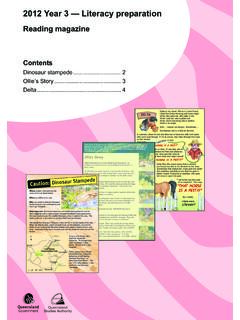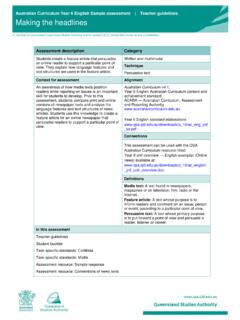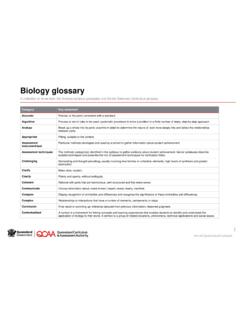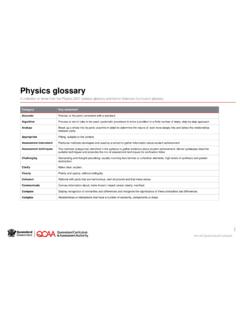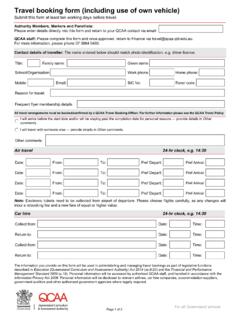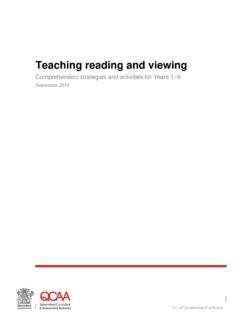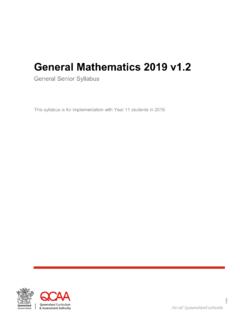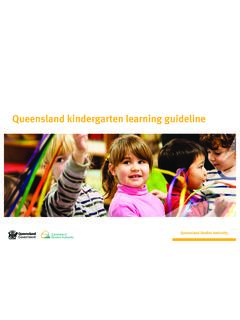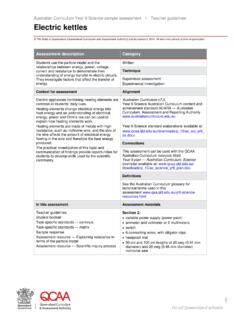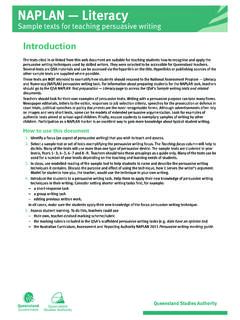Transcription of Queensland kindergarten learning guideline
1 180831 Queensland kindergarten learning guideline July 2018 This guideline is for implementation in 2019. ISBN: 978-1-74378-077-0: Queensland kindergarten learning guideline . July 2018 The State of Queensland ( Queensland Curriculum & Assessment Authority) 2018 Queensland Curriculum & Assessment Authority PO Box 307 Spring Hill QLD 4004 Australia 154 Melbourne Street, South Brisbane Phone: (07) 3864 0299 Email: Website: Contents Purpose _____ 1 Perspectives .. 2 Principles .. 3 High expectations, equity and respect for diversity.
2 3 Respectful relationships .. 3 Collaborative partnerships .. 3 Effective pedagogies .. 3 Reflective practice and professional decision-making .. 3 Practice _____ 4 Decision-making .. 4 Developing learning contexts .. 4 Interacting with and responding to children .. 5 Intentional teaching practices .. 5 Assessment .. 6 Continua of learning and development _____ 7 The continua of learning and development .. 7 Using the continua .. 7 learning and development areas _____ 9 Identity _____ 10 Key focus: Building a sense of security and trust.
3 10 Key focus: Acting with independence and perseverance .. 11 Key focus: Building a confident self identity .. 12 Connectedness _____ 13 Key focus: Building positive relationships .. 13 Key focus: Showing respect for diversity .. 15 Key focus: Showing respect for environments .. 17 Wellbeing _____ 18 Key focus: Building a sense of autonomy .. 18 Key focus: Exploring ways to be healthy and safe .. 20 Key focus: Exploring ways to promote physical wellbeing .. 21 Active learning _____ 22 Key focus: Building positive dispositions towards learning .
4 22 Key focus: Showing confidence and involvement in learning .. 24 Key focus: Using technologies for learning and communication .. 25 Communicating _____ 26 Key focus: Exploring and expanding language .. 26 Key focus: Exploring literacy in personally meaningful ways .. 28 Key focus: Exploring numeracy in personally meaningful ways .. 30 Supporting children s transition to school _____ 32 Transition statements .. 32 Parent/carer consent to share transition information .. 32 Queensland kindergarten learning guideline Queensland Curriculum & Assessment Authority July 2018 Page 1 of 32 Purpose The QKLG supports kindergarten teachers professional practice in a range of contexts across Queensland .
5 It adopts the vision of the Early Years learning Framework (EYLF) that all children experience learning that is engaging and builds success for life . The QKLG provides specificity for children s learning across the year before starting school, recognising that children bring with them diverse identities and backgrounds. It acknowledges that parents/carers are children s first teachers and values the vital role families play in children s lives and their ongoing learning . The term families is used throughout the guideline to recognise the range of people who take on parenting roles.
6 The QKLG provides a framework aligned to the EYLF and is designed to support teachers to plan and implement quality teaching and learning . Resources that support quality teaching and learning in a kindergarten program can be accessed on the QCAA website. Alignment between EYLF and QKLG The QKLG describes a set of five learning and development areas that align to the five broad learning outcomes identified in the EYLF, as set out in the table below. Table 1 learning and development areas EYLF QKLG learning and development areas Key focus Significant learnings Children have a strong sense of identity Identity Building a sense of security and trust feeling safe.
7 Accepted and supported developing a sense of belonging and confidence in others Acting with independence and perseverance managing routines developing agency in decision-making being willing to keep trying Building a confident self-identity developing awareness of own culture/s recognising individual strengths and achievements Children are connected with and contribute to their world Connectedness Building positive relationships connecting with and relating to others understanding rights and responsibilities Showing respect for diversity responding to others with respect developing awareness of bias learning about others cultures Showing respect for environments caring for the kindergarten exploring interactions between people and environments Queensland kindergarten learning guideline Queensland Curriculum & Assessment Authority July 2018 Page 2 of 32 EYLF QKLG learning and development areas Key focus Significant learnings Children have a strong sense of wellbeing Wellbeing Building a sense of autonomy developing
8 Self-regulation developing resilience Exploring ways to be healthy and safe being healthy staying safe Exploring ways to promote physical wellbeing developing control and strength developing awareness of the senses Children are confident and involved learners Active learning Building positive dispositions towards learning showing curiosity and enthusiasm for learning problem-solving, investigating and reflecting on learning being imaginative and creative Showing confidence and involvement in learning applying knowledge in different contexts sharing ideas and discoveries Using technologies for learning and communication showing interest in technologies using technologies Children are effective communicators Communicating Exploring and expanding language using language/s.
9 Including signing listening and responding Exploring literacy in personally meaningful ways engaging with different texts exploring sounds and letters exploring reading and writing Exploring numeracy in personally meaningful ways exploring mathematical concepts in everyday life exploring counting and patterns Perspectives The QKLG reflects the view that learning occurs as part of, and is shaped by, the social and cultural interactions between children, teachers, colleagues, families, community members and professional partners.
10 It adopts a holistic perspective on teaching and learning that: promotes social, emotional, physical and cognitive development and wellbeing views children as diverse learners, who are competent and creative meaning-makers encourages children to investigate and explore materials and ideas through play and purposeful interactions. Queensland kindergarten learning guideline Queensland Curriculum & Assessment Authority July 2018 Page 3 of 32 Principles The following principles promote continuity in children s learning and provide the foundation for successful transition to school.
